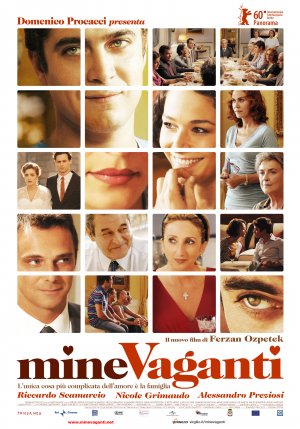
MINE VAGANTI (LOOSE CANNONS)
Italy, 2010, 115 minutes, Colour.
Riccardo Scarmaccio.
Directed by Ferzan Ozpetek.
For more than a decade, Turkish-born but Italian resident and film director, Ferzan Ozpetek, has made a series of films about families and/or special groups (Fati Ignoranti, Facing Window). He also made the evocative Sacro Cuore about service of the poor and self-sacrifice.
Here is another family portrait, the Contante family of Lecce who owns a pasta-making factory. Some magic realism inserts itself into the realistic narrative, especially with the free-spirited (loose cannon) grandmother who founded and guided the enterprise with the brother-in-law she loved. Flashbacks to her wedding recur through the film.
Concerning family: the patriarch, Vincenzo, needs to do a business deal to consolidate his firm. His older son, Antonio,runs the factory well. The younger son, Tommaso, plans to tell the truth about himself at the special business dinner – that he has studied literature in Rome rather than business, that he is a writer and that he is gay. The dinner turns out rather differently from what was anticipated. Ozpatek has always had gay themes and acceptance of the reality of homosexuality in this films. It is to the fore here, criticising traditional Italian homphobia and inserting some camp, caricature humour. This is a commedia sul serio.
1.A portrait of an Italian family, their past, the contemporary story, the issues?
2.The city of Lucca? Ancient, modern? Homes, shops, the factory? The musical score and songs?
3.The title, the grandmother, the advocating of free spirits?
4.The prologue and the bride, going through the countryside, the ruins, her veil in the wind? Encountering Nicola, with the gun, the struggle, going back to the wedding, the recurring presence of this story throughout the film, the marriage, the ending – and everybody mingling? The influence of the free spirit on other generations of the family?
5.Vincenzo, the factory, relying on Antonio, the preparation of the deal with Brunetti? Expectations? The meal?
6.Tomaso and his place in the family, younger brother, going to Rome, studying literature rather than business, lying to the family? His wanting to be a writer, his manuscript with the publisher? Telling Antonio that he was gay? The anticipation of the dinner and his announcement?
7.Alba, wilful, the car, scratching the other car, her range of shoes, at the dinner, her business ability?
8.The grandmother, her strength, her place in the family, setting up the company with Nicola? Their devotion over the years? Vincenzo as the patriarch, Stefania as the proper wife? Elena and her husband, his claiming a place in the family? The dinner establishing the characters?
9.Antonio’s speech, declaring he was gay, the story of Michele? His father’s reaction, his mother, the silence at the table? Tomaso dumbfounded? Antonio leaving? His mother not stopping him? His mother’s reflection, thinking that she should have known, not known, her searching through the photos? The story of the wreath and Tomaso making it? Antonio’s later return, the encounter with Tomaso, telling him the story of going to Michele, his actions in the past and firing him, setting up the house, Michele saying it was too late to re-establish the relationship?
10.Tomaso and his being trapped, having to go to the factory, working with Alba, the work, talking to his mother? The phone calls to Marco, his dilemmas? Telling Alba the truth? The visit of his friends, their farcical and camp behaviour? With Marco, the night? The dance in the water, his love for Marco, telling his father he wanted to be a writer, making the decision, his grandmother’s approval?
11.Alba, the story of her life, with her father, work, her skills, listening to Tomaso, enjoying the company of the friends, the hard work at the factory?
12.Elena, her husband, her fat children? Her being invited by Tomaso to make decisions, the deal with the workers? Her husband and his work in the factory? His eyes for the camp Neapolitan?
13.Vincenzo, the reaction to his son’s announcement, the heart attack, in hospital, the mistress and the massage, his wife’s disdain? His coming out, taking Tomaso through the city, laughing out loud but thinking people were all talking about him? His wife and sister and the gossip, their going to the shop, their catty remarks?
14.The arrival of the friends, their backgrounds, characters, camp, caricature, the camp humour, trying to be straight? The song and dance routine in the water?
15.The aunt, her story, London, being rescued and taken home? Her drinking, disguising her rendezvous by shouting ‘Stop thief’, talking about keeping the windows open? With the gays? With the children?
16.The grandmother, her decision to eat all the sweets, her death?
17.The maids, at beck and call, their observations and reactions?
18.The grandmother’s funeral, the carrying of the coffin, the mother linking arms with her two sons, the father having to reconsider? Antonio present? The group in the entourage?
19.The final dance of life, everybody dancing, intermingling, Tomaso observing – and inheriting the story and writing it up?